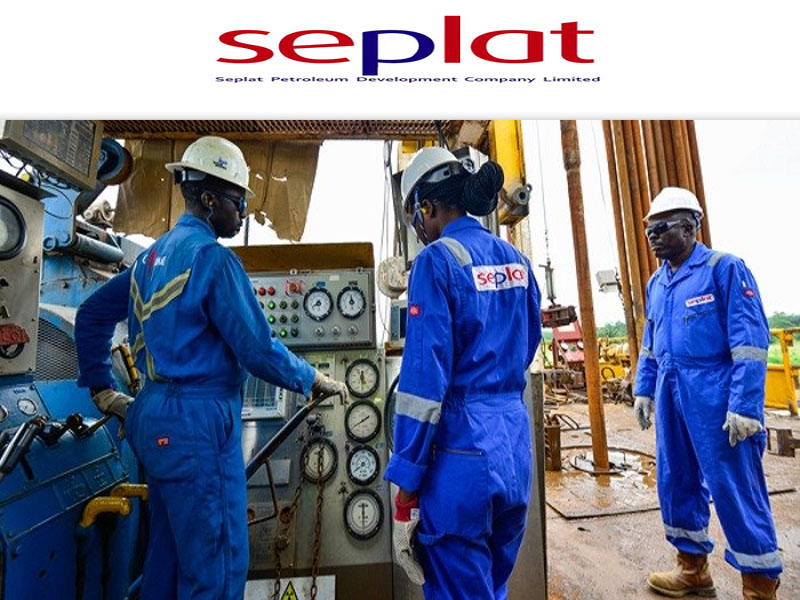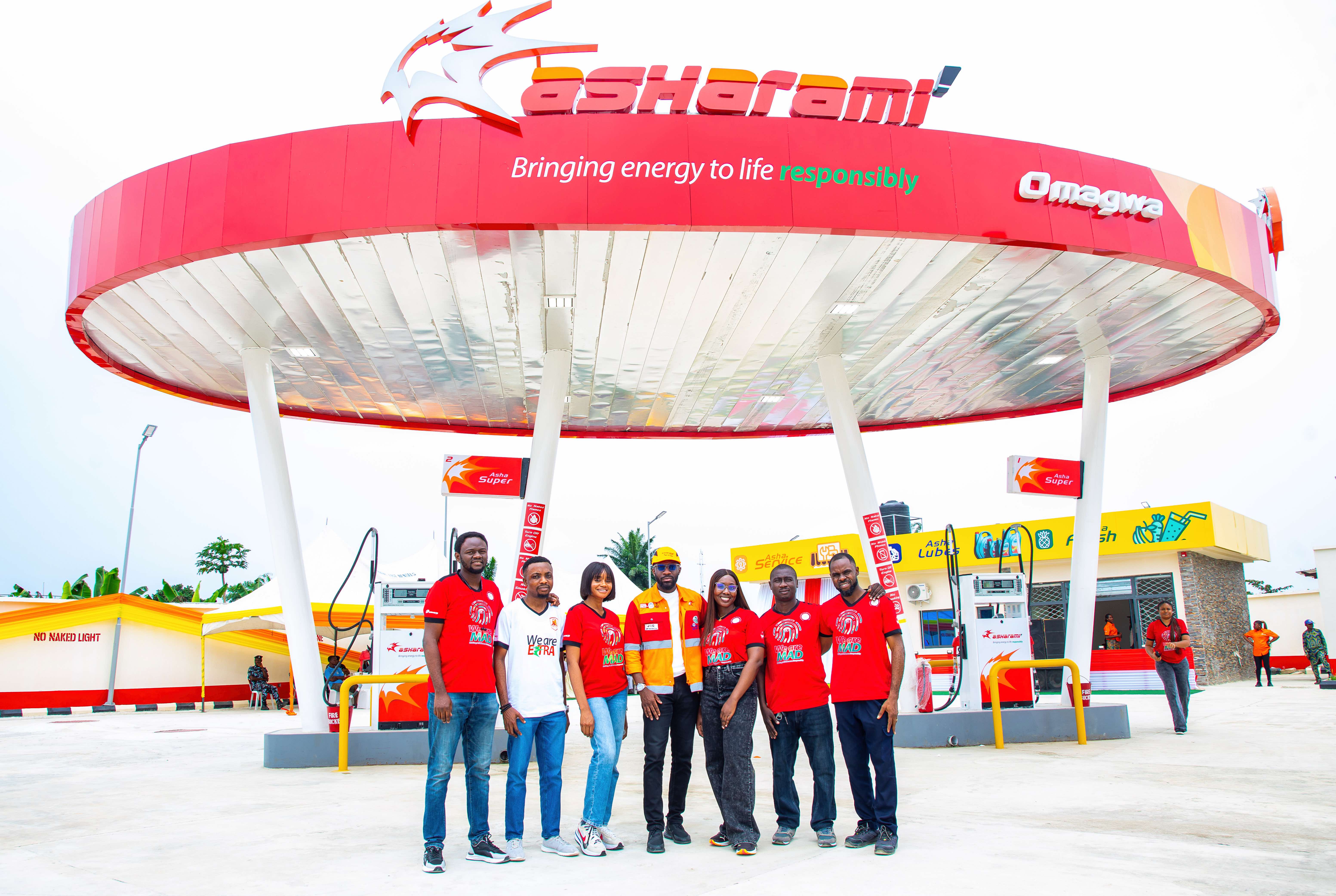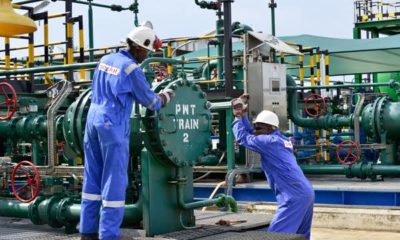Energy
Seplat Energy ratings Upgraded to ‘B’ by Fitch, Outlook Stable

Precious ADELOLA
LONDON, UK – Seplat Energy Plc (“Seplat Energy” or “the Company”), a leading Nigerian independent energy company listed on both the Nigerian Exchange Limited and the London Stock Exchange, has been upgraded to ‘B’ from ‘B-‘ by Fitch Ratings on its Long-Term Issuer Default Rating (IDR).
Fitch also confirms Seplat Energy’s Outlook to be ‘Stable’ and upgraded the Company’s senior unsecured rating for USD650 million senior notes due 2026 to ‘B’ from ‘B-‘, with a Recovery Rating of ‘RR4’.
The rating agency stated: “The upgrade reflects improved financial flexibility and a strong liquidity profile following debt refinancing in 2021, which in our view will help Seplat Energy survive for more than two years of force majeure without access to the Trans Forcados Pipeline (TFP). Amukpe-Escravos Pipeline (AEP), an alternative oil export route, has been completed and is undergoing commissioning, according to Seplat, but there is no certainty around when it will ship its first oil.”
The rating incorporates the small scale of Seplat Energy’s cash flows, concentration of the company’s asset base in Nigeria (B/Stable) and a historically unstable operating environment in the troubled Niger Delta, including recurring issues with the oil transportation system. The rating also reflects moderate leverage, conservative financial policies, competitive unit profitability, end-2020 2P reserve life of 27 years, and a growing domestic gas business.
Specifically, Fitch upgraded Seplat Energy’s $650m bonds to B from B-. The upgrade reflects improved financial flexibility and a strong liquidity profile following debt refinancing in 2021. Because of Seplat Energy’s prudent approach to financial management, Fitch believes the company has built a very strong balance sheet. Even if the Trans Forcados Pipeline was in force majeure for an unprecedented two years, Seplat Energy has sufficient strength to survive and service its debt interest
Fitch view is underpinned by its view of Seplat Energy’s prudent debt management, flexibility on dividends and flexibility to deploy capex. Fitch sees Seplat Energy’s gas business as having potential to enhance cash flows, particularly after ANOH comes onstream; ANOH itself is already fully funded
Fitch lauds Seplat Energy’s ESG efforts and notes deeper communication and cooperation between local communities, the government and Seplat have significantly reduced the number of attacks on oil infrastructure.
KEY RATING DRIVERS
Resilience to Prolonged Pipeline Disruption: Seplat Energy’s debt refinancing in 2021 has resulted in no maturities in 2022 and just USD27 million of maturities in 2023. Its debt repayments are USD44 million in 2024 and USD40 million in 2025. We expect Seplat to be able to service its debt even in the extreme scenario that its export route via TFP is not operational in 2022-2023. It had USD220 million of unrestricted cash at 30 September 2021, and it should be able to generate cash flows from its eastern assets and use the expensive Warri refinery export route for its western assets if TFP is shut down.
Continued Delays with AEP: Following multiple delays since 2014, Seplat Energy’s latest guidance on AEP’s first oil flow is December 2021. Seplat also needs to agree offtake terms for the oil before shipments can begin. The start of oil deliveries though AEP remains uncertain, in our opinion. AEP will allow oil exports of 40 kb/d, reducing over-reliance on the TFP export route that had adversely affected Seplat in the past. The underground AEP should materially improve the pipeline uptime (74% in 9M21 for TFP) and shrink losses from crude theft and reconciliation (11%).
Small Nigerian E&P Company: Seplat Energy’s operations are concentrated around the Niger Delta region of Nigeria. The Nigerian oil and gas sector is characterised by high operational risks and regulatory uncertainty. Its main assets are oil mining leases (OMLs) 4, 38 and 41, which accounted for around 79% of 9M21 production and are reliant on the TFP. We expect Seplat to ramp up its daily oil and gas output to 59 thousand barrels of oil equivalent per day (kboe/d) until 2024 from 47 kboe/d in 9M21. In our view, OPEC+ cuts, which are gradually being unwound, will not hinder Seplat’s production growth.
Inorganic Growth: Fitch expects Seplat Energy’s management to actively seek opportunities for inorganic growth in Nigeria. Domestic opportunities exist as oil majors continue to streamline their portfolios, exiting Nigeria. Seplat Energy’s ability to expand through acquisitions is boosted by an undrawn USD350 million revolving credit facility (RCF). We view Seplat’s financial policies as conservative for the rating with funds from operations (FFO) net leverage averaging 1.7x in 2021-2025. Our view is underpinned by debt management, flexibility on dividends and on capex, as seen during the TFP non-availability in 2016-2017. We view large acquisitions as an event risk.
Gas Business Provides Stability: Seplat Energy’s growing footprint in the domestic gas market will enhance cash flow stability as gas sales benefit from more predictable domestic gas prices than oil. Nevertheless, regulated gas price under domestic supply obligation for power generation (around 30% of Seplat’s gas volumes) was lowered in July 2021 to USD2.18 per thousand cubic feet (kcf) from USD2.5/kcf, after having been flat through 2014-2020. Seplat sells the rest of its gas to commercial companies at contract prices averaging USD2.9/kcf. Its gas production was 19 kboe/d in 9M21, or 41% of total hydrocarbon volumes.
ANOH Plant Scheduled for 1H22: ANOH gas processing plant (GPP) – which is 50%/50%-owned by Seplat and Nigerian Gas Company Limited (NGC) – underpins the former’s effort to further expand gas operations, adding 300 kcf/d to its existing 465 kcf/d gross processing capacity. The JV partners have finalised non-recourse debt funding for the project, which is an important milestone. Seplat expects to start receiving dividends from 2023, although we conservatively do not include any contribution in our rating case. Seplat is also marginally expanding its GPP at Sapele and adding liquefied petroleum gas unit to it.
Income Tax Capital Allowance: Seplat Energy pays income tax that is reduced by its accumulated capital allowance derived from historical expenditures. We forecast its effective income tax rate on oil production to remain considerably below the nominal 85% until its USD747 million capital allowance at end-3Q21 is exhausted. We conservatively assume that Seplat will start paying significantly higher income taxes in 2025, based on our oil-price assumptions. Seplat has an option to remain in the current tax regime until its concession terms expire despite the enactment of the new tax system in 2021.
ESG – Social: Fitch has revised Seplat Energy’s ESG Relevance Score for Human Rights, Community Relations, Access & Affordability to ‘4’ from ‘5’ as deeper communication and cooperation between local communities, the government and Seplat Energy has significantly reduced the number of attacks on oil infrastructure. The uptime in recent years was 74% in 9M21, 83% in 2020, 92% in 2019 and 85% in 2018, compared with 50% in 2017.
Seplat Energy’s upstream operations focus on the troubled Niger Delta region. Historically, this area has been a high-risk environment driven by militancy, crude oil theft, pipeline sabotage, as well as environmental pollution arising from militant strikes against oil infrastructure. TFP was shut down for 305 days in 2016 and more than 182 days in 2017, adversely affecting the company’s operations.
– End –
Energy
Asharami Synergy Unveils Fuelling Solutions In Omagwa

In line with its commitment to driving access to quality petroleum products, Asharami Synergy Limited, a leading Sahara Group downstream company, has said the public can now access exceptional fuelling solutions at its newly commissioned retail station in Omagwa, Rivers State.
Situated strategically along the Airport Road in Omagwa, the station, which features a storage capacity of 45,000 litres each for Automotive Gas Oil (AGO, also known as diesel) and Premium Motor Spirit (PMS, also known as petrol) is equipped with two pumps and four discharge nozzles for PMS and AGO.
The facility also has ample space for sundry services in a bid to ensure consumers get more “miles and smiles” as well as the energy to “go further” with Asharami’s world-class products.
“The Asharami Omagwa Retail Station is fully operational, offering a range of premium products and services. It’s a one-stop shop that also gives our esteemed customers eat-in and take-out restaurant services, shopping, as well as the Asha lubricants and Asha Service experience which will ensure premium care for all classes of automobiles and engines,” said Oladimeji Williams, Head, Government Relations and Business Development at Asharami Synergy.
ALSO READ: NNPCL Launches Utapate Crude Oil Blend, Eyes Production Expansion In 2025
At the Commissioning, Willaims said the new station represents an important step in Asharami Synergy’s expansion plan aimed at reaching and serving more communities responsibly. “This station is strategically positioned close to the airport, serving as the gateway for powering socio-economic development in the community and those close to it, while enabling Asharami Synergy integrate all aspects of its downstream business towards ensuring efficiency and value for our customers,” he stated.
Williams commended the Federal Airport Authority of Nigeria (FAAN) and the Omagwa community leaders for their support and collaboration throughout the project’s duration, describing it as a “seamless and productive process that highlights Asharami’s corporate stewardship and social impact” in the community.
Similarly, Ifesinachi Ezike, Regional General Manager (South South), FAAN, emphasized the broader significance of the new station, stating, “This occasion marks a significant milestone not just for Asharami Synergy but for the airport and the entire community. It marks not just an opening of a new facility but the beginning of a renewed commitment to enhancing the travel experience of all our passengers and stakeholders”.
In a move that underscores its commitment to sustainability and community development, Asharami Synergy also commissioned a solar-powered borehole during the launch. The borehole is set to improve access to clean and reliable water for residents, marking a tangible contribution to the local community.
“At Sahara, we are always making a difference—not just through our business operations; we are unwavering in our commitment to driving sustainable development and building partnerships that enhance the well-being of our host communities,” Williams added.
Energy
Awards Galore For Shell, Staff At NAPE 2024 Conference

The Shell companies in Nigeria and staff won awards in recognition of their robust participation at the 42nd Annual International Conference and Exhibition of the National Association of Petroleum Explorationists (NAPE), held in Lagos.
At the closing dinner of the event, the Managing Director of Shell Nigeria Exploration and Production Company (SNEPCo), Ronald Adams pledged sustained efforts by the company to address “the Nigerian energy trilemma by powering progress towards energy security in a sustainable manner”.
On the awards, the Shell was declared Best Overall Exhibitor and Best Exhibiting Energy company (International) just as Geophysicist Somime Oguntola took home the Award of Excellence for Oral Paper (second place).
The icing on the cake was a Shell staff, Johnbosco Uche, being installed as the new President of the NAPE.
It was gathered that the Shell companies in Nigeria have supported NAPE since its founding in 1975, using the skills and expertise of the large pool of energy professionals in its employment to improve its activities especially educational and mentoring programmes.
In addition to being a major sponsor of the 2024 conference, Shell mounted a high-profile exhibition, featuring among other things, career counselling, engagements on Nigerian Content and Contractor development and panel sessions on Women in Industry and Sustainability Energy Challenge.
A highlight was the Shell medical stand which attended to more than more than 500 conference participants and members of the public over the four days of the annual event. The doctors and nurses offered a wide range of services including laboratory tests, deworming, medical consultation as well as ophthalmology checks and distribution of nearly 300 eyeglasses.
Adams referred to the operations of SNEPCo as an example of Shell’s contribution to energy security in Nigeria. “As a result of sustained production from Bonga, we have provided funds to finance development, created a new generation of Nigerian Deepwater professionals, empowered indigenous contractors and service providers, and implemented social investments that have touched lives in the six geo-political zones of the country,” he said.
Adams added, “SNEPCo and indeed Shell are in Nigeria for the long haul. Our commitment is reflected in both our current and growth plans, all of which are grounded in principles of safety, affordability, and competitive performance.”
Energy
Accugas Denies Culpability In Akwa Ibom’s Power Outage

Owing to the persistent power outage, which has crippled economic and social life in most parts of Akwa Ibom State and environs, Accugas Limited has washed its hands off the ugly situation.
This was contained in a statement under the signature of its Communications Manager, Okwudili Onyia, in which the company traced the anomaly to a “fault in the 132-KV Aba-Itu transmission line”.
To ameliorate the situation, the company maintained that “It is imperative that the restoration of the Aba-Itu line is completed as soon as possible.”
In addition, the company pledged thus, “Accugas will continue to partner with, and support, the government of Akwa Ibom State towards achieving the government’s agenda for economic development and prosperity of the state.”
ALSO READ: NNPC Ltd To Supply 100mmscf/d Gas To Dangote Refinery
The statement reads, “Accugas Limited, a subsidiary of Savannah Energy, wishes to strongly deny the misinformation concerning its alleged involvement in the current power outage in Akwa Ibom State.
“The power cut in Akwa Ibom State is entirely due to the reported fault in the 132-KV Aba-Itu transmission line, which, unfortunately, is preventing power being transmitted from the National Grid into the State. It is imperative that the restoration of the Aba-Itu line is completed as soon as possible.
“Ibom Power Company (“IPC”) is one of 23 thermal power generation companies which channel power to the National Grid, which in turn disseminates all accumulated power to each State of the Federation through the electricity distribution companies (“Discos”). Indeed, Accugas supplies gas to enable c. 20% of Nigeria’s thermal generation capacity and, as such, is a critical enabler of the Nigerian economy.
“Within Akwa Ibom State, Accugas has been the sole supplier of gas to IPC since 2014 and, together with other Savannah subsidiaries, has invested over US$1.5 billion in gas development within the state. Furthermore, Savannah has recently invested c. US$45 million in a gas compression project at Accugas’ Uquo central processing facility at Esit Eket. Accugas’ commitments also extend to several social investment projects in the state. All the foregoing investments and projects, including other imminent investments Accugas intends to make in the State, demonstrate the Company’s long-term commitment to Akwa Ibom State and Nigeria.
“Accugas will continue to partner with, and support, the government of Akwa Ibom State towards achieving the government’s agenda for economic development and prosperity of the state.”

















